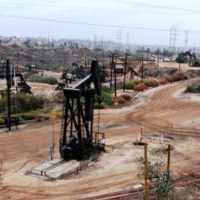Consultant on Keystone XL Pipeline Gives Baldwin Hills Fracking a Clean Bill of Health
 Inglewood Oil Field (photo: David Roy, InsideClimate News)
Inglewood Oil Field (photo: David Roy, InsideClimate News)
A yearlong study paid for by the owner of the Inglwood Oil Field in the Baldwin Hills area of Los Angeles County has concluded that hydraulic fracturing―the controversial practice of oil and gas extraction known as fracking―poses no harm to the environment.
Fracking injects pressurized water, along with other chemicals, into rock and is often used in fields when conventional drilling no longer is effective. Critics say it has been linked to groundwater contamination, air pollution, releases of methane gas, micro-earthquakes and sink holes.
Baldwin Hills residents, who sit atop the Newport-Inglewood Fault, expressed concerns that fracking might be affecting the already-unstable ground. The study was part of a settlement in response to their very vocal objections and four lawsuits filed in 2008.
Cardno Entrix, an environmental consulting firm, wrote the 206-page report for Plains Exploration and Production Co., and it was reviewed by two independent firms selected by the company and Los Angeles County.
The Houston-based consulting firm was the consultant to the U.S. Department of State on TransCanada’s Keystone XL Pipeline and wrote the official environmental reports for the 1,700-mile conduit from Canada to Texas via six states. Cardno Entrix found that the controversial project would have “limited adverse environmental impact,” signaling a start for the permit process.
Opponents of the pipeline were not happy with the government’s handling of the environmental review process, which was further questioned when Cardno Entrix referred to TransCanada, the pipeline owner, as a “major client” in company advertisements. That, and news reports in late 2011 on the financial ties between the two companies, prompted a group of senators to call for hearings on the matter.
Keystone XL is part of a proposed pipeline system for transporting products made from oil sands in Alberta, Canada, to American refineries and the Gulf Coast for shipping. Oil sands are considered one of the dirtiest sources of petroleum, and the product is already outlawed for use by the U.S. government under Section 526 of the Energy Independence and National Security Act of 2007. The section prohibits the government from purchasing fuels that have a higher carbon footprint than conventional oil.
In December 2011, Congress gave President Barak Obama a 60-day deadline to make a decision on the pipeline and the next month he rejected the project permit, saying there wasn’t enough time for a proper environmental assessment.
Fracking is virtually unregulated in California. Two Assembly bills to control it died in the last session of the state Legislature. One would have required drillers to disclose where they are drilling and what kind of chemicals they inject into the ground during the process, and the other would have imposed a moratorium on fracking until more is known about it.
–Ken Broder
To Learn More:
Inglewood Oil Field Fracking Study Finds No Harm from the Method (by Ruben Vives, Los Angeles Times)
Cardno Entrix Pipeline Review Contract Raises Sticky Ethics Issues for Engineers (by Richard Korman, Engineering News-Record)
The Keystone XL Pipeline: Houston's Cardno Entrix in the Crosshairs (by Liana Lopez, HoustonPress)
Pipeline Review Is Faced with Question of Conflict (by Elisabeth Rosenthal and Dan Frosch, New York Times)
Tar Sands Oil Pipeline Would Violate Bush-Era Pollution Law (by Noel Brinkerhoff, AllGov)
Fracking in Culver City (Baldwin Hills Watch)
- Top Stories
- Controversies
- Where is the Money Going?
- California and the Nation
- Appointments and Resignations
- Unusual News
- Latest News
- California Forbids U.S. Immigration Agents from Pretending to be Police
- California Lawmakers Urged to Strip “Self-Dealing” Tax Board of Its Duties
- Big Oil’s Grip on California
- Santa Cruz Police See Homeland Security Betrayal in Use of Gang Roundup as Cover for Immigration Raid
- Oil Companies Face Deadline to Stop Polluting California Groundwater





